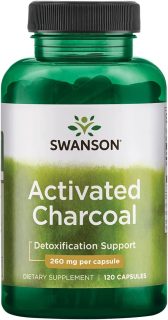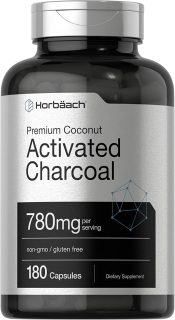Activated charcoal is a substance that has grown in popularity over the years. Cited for its efficiency in emergency toxin removal, treating alcohol poisoning, and even whitening your teeth, it has established itself as the ultimate detox tool in various aspects. Yet, research suggests that it is beneficial for your health and well-being.
How Is It Made?
Charcoal is made from peat, coal, wood, coconut shell, or petroleum. Activated charcoal is a black, odorless, flavorless supplement that has been used since ancient times for its health benefits. It is charcoal that scientists treat with oxygen at very high temperatures to make it porous. As a substance used for hundreds of years due to its detoxifying abilities, and even the treatment of certain conditions, activated charcoal may be a jack of all trades.
How Does It Work?
You may think that activated charcoal works like a sponge, absorbing everything in your body that it comes into contact with, but it’s a lot more complex than that. The charcoal is activated by changing its internal structure to increase its surface area natural absorption capacity, by creating more pores in it.
These pores help charcoal trap chemicals. This results in a fine black powder that sellers either sell in powder form or as encapsulated supplements.
Health Benefits of Activated Charcoal
1. Mold Toxicity
Mold is a common fungus that grows in places with a lot of moisture, such as roofs, pipes, ceilings, and floors. While it is quite common, mold can be dangerous, especially for people who are allergic to mycotoxins, occurring toxins that mold emits.
Megan McElroy, PA-C is a physician assistant at Parsley Health in New York City. According to her, the symptoms of mold issues fall into two main categories:
1. Immune reaction: These are allergy-like symptoms. These include sinus issues, runny nose, itchy skin and eyes, asthma, and shortness of breath.
2. Chemical and inflammatory reactions: These are driven by mycotoxins and the symptoms are vaguer. They include:
- cognitive difficulties (brain fog, mood swings, anxiety, and poor memory)
- abdominal pain
- a metallic taste in the mouth
- digestive issues
- symptoms resembling hormone imbalances (such as rashes, acne, and hair loss).
Research has shown that activated charcoal has the ability to bind to mycotoxins. This cleanses your body and alleviates mold toxicity.
2. Digestive System Health
Digestive health is important. The digestive system undoubtedly plays a major role in your health, bringing nutrients to your entire body. With an imbalanced gut, your body struggles to absorb these nutrients. Without good digestive health, you will experience a host of uncomfortable symptoms.
The gut microbiome exists in the large and small intestines. It is home to approximately 100 trillion microorganisms. According to a 2021 study in Nature, an enriched microbiome can help us live well into our 80s and 90s. Good bacteria and microorganisms are necessary for many important functions. Unfortunately, the gut microbiome also contains harmful microorganisms which can throw off the entire balance of the gut.
Rouenne Seeley, D.O. is a board-certified gastroenterologist who serves as a clinical assistant professor of medicine. She says that “your digestive system contains a healthy amount of bacteria.” She adds that “when the bacteria… becomes imbalanced, you’ll likely experience physical symptoms.”
It is associated with various chronic diseases, including type 2 diabetes, inflammatory bowel disease, cardiovascular disease, and colorectal cancer.
Signs of an unhealthy gut include:
- Bloating
- Unintentional weight fluctuations
- Skin issues (including acne, rosacea, eczema, psoriasis, and even dandruff)
Activated charcoal helps to promote a healthy digestive tract. It removes toxins that are responsible for causing allergic reactions, oxidative damage, and poor immune system function. By removing these toxins from your body, you can also reduce joint pain, increase energy, and increase mental function.
3. Reducing high cholesterol
Cholesterol is a waxy substance in your blood that the body needs to build healthy cells. Yet, in high amounts, it can pose a serious health risk. Attaching to proteins, this combination is a lipoprotein. There are two types of cholesterol:
- Low-density lipoprotein (LDL): LDL is also known as bad cholesterol. It builds up inside the walls of your arteries in a process known as atherosclerosis. Blood flow and oxygen supply to vital body organs are then reduced, causing health problems such as heart disease and stroke.
- High-density lipoprotein (HDL): HDL is also known as good cholesterol. HDL picks up any excess cholesterol and takes it back to your liver, which flushes it from the body. High levels of HDL can lower your risk for heart disease and stroke.
Studies have shown that activated charcoal can reduce bad cholesterol, even better than some prescription medications. In one study, total cholesterol decreased by 25%, with LDL cholesterol decreasing by 41%. Along with this, HDL cholesterol increased by 8%, in 4 weeks, with participants taking 3 doses of 8 grams each day for the duration of the study.
4. Promoting Kidney Health
From removing waste and extra fluid from your body to activating a form of vitamin D, aiding the absorption of calcium building bones, and regulating muscle function. Your kidneys are important for your health and general well-being.
Activated charcoal helps prevent cellular damage to the kidneys and liver. It also supports healthy adrenal glands. While healthy kidneys are well able to filter impurities out of the blood, activated charcoal can give them a functional boost by reducing the amount of waste the kidney has to filter. It has the ability to bind to urea and other toxins, making it helpful to those with weakened kidney function.
In fact, research has shown that for patients with end-stage renal disease (ESRD), activated charcoal may be a good alternative to dialysis. The study found that after 10 months of taking activated charcoal, “a significant decrease in blood urea and creatinine levels was observed and none of the patients required emergency dialysis during this time.”
Potential Side Effects
While activated charcoal is generally safe for most adults when used short-term, mild side effects can include constipation and black stools. The more serious, but rare, side effects are:
- Slowing or blocking of the intestinal tract
- Regurgitation into the lungs
- Dehydration
Those Who Should Be Cautious
- Pregnant and breast-feeding women: While activated charcoal might be safe when used short-term while you’re pregnant or breastfeeding, you should still consult your healthcare provider.
- Gastrointestinal (GI) Blockage: If you have any intestinal obstruction or any condition that slows the passage of food through your intestine, do not use activated charcoal, unless your healthcare provider is monitoring you.
- Taking Medication: Since activated charcoal absorbs substances in the stomach and intestines, it can decrease how much medicine your body absorbs, thereby decreasing its effectiveness. If you’re on any medication, consult your healthcare provider.
Implementing This Detox Supplement
Activated charcoal is effective at keeping illicit substances and poisons from being absorbed from the gut into the bloodstream. As a result, it could be helpful in countering unknowingly ingesting them.
While we need more research to establish its effectiveness in this, the wide range of health benefits should be enough to consider implementing this supplement into your life. Some of our recommendations include:
 Swanson Activated Charcoal – Natural Supplement
Swanson Activated Charcoal – Natural Supplement

Horbäach Premium Coconut Activated Charcoal
MAIN IMAGE CREDIT: Photo by Anete Lusina/Pexels
References
- Zellner, T., Prasa, D., Färber, E., Hoffmann-Walbeck, P., Genser, D. and Eyer, F., 2019. The use of activated charcoal to treat intoxications. Deutsches Aerzteblatt International, 116(18), p.311.
- Khitan, Z.J., Khawaja, I., Mufson, M.A., Sanabria, J.R., Abraham, N.G., Peterson, S.J., Sundaram, U. and Shapiro, J.I., 2020. Can charcoal improve outcomes in COVID-19 infections?. Medical hypotheses, 144, p.110176.





![women [longevity live]](https://longevitylive.com/wp-content/uploads/2020/01/photo-of-women-walking-down-the-street-1116984-100x100.jpg)









